8 Best B2B Marketplaces in 2023
Trade, an exchange of goods, services and resources, is said to be the lifeblood of global progress, creating opportunities, fostering innovation and bringing countries and cultures together. Today a large portion of trade is done online, through companies’ websites – or at specialized marketplaces.
We can speak about B2C vs B2B trade, or ‘business to customer’ vs ‘business to business’. While B2C targets individuals or end users, B2B trades with businesses. Some market players combine the two, for example, Siemens producing home appliances and smart home solutions in the B2C domain and automation, energy management, transportation and healthcare solutions for B2B. Other companies operate mostly in B2B and are less known to the general public, like Honeywell with solutions for aerospace, building technologies, safety and productivity, or McKinsey with consultations and advisory services on strategy, digital transformation, and organizational design. The concept of a B2B marketplace was created especially for them.
▶ What are B2B Platforms?
▶ Alibaba
▶ Amazon Business
▶ Upwork
▶ GoDirect Trade
▶ Mable
▶ Arrow
▶ G2 and Capterra as B2B SaaS platforms
▶ Conclusion
What are B2B Platforms?
The global B2B market is growing rapidly, with the overall B2B gross merchandise volume increasing from $5.83 trillion in 2013 to $12.2 trillion in 2019, and still growing. The onset of e-commerce has revolutionized not only the B2C domain – today’s global B2B e-commerce market stood at $17.9 trillion in 2021, which was five times more than the B2C e-commerce. While some B2B companies benefit from e-commerce selling directly through their own websites, many others sell on B2B marketplaces.
A B2B marketplace is a platform where various B2B companies list their goods and services and sell alongside their competition. Such online platforms connect businesses and serve as a virtual marketplace where companies sell products, services or resources directly to other businesses. Leveraging B2B marketplaces, companies can extend their reach and access a wider pool of customers. Buyers can, in turn, make a decision about a purchase by browsing through many listings, comparing specifications and prices and finding the most suitable offers. In addition, marketplace platforms often provide features that protect both the seller and the buyer, such as secure payments, order management tools, quality assurance and dispute resolution.
Depending on the focus and target audience, we can speak about horizontal or vertical marketplaces. Horizontal marketplaces allow you to list a wide range of product categories and encompass various industries, while vertical ones, also known as niche marketplaces, provide a narrow platform for a particular sector, with industry-specific goods and services. Below, we will review the major B2B marketplaces of both types.
Alibaba
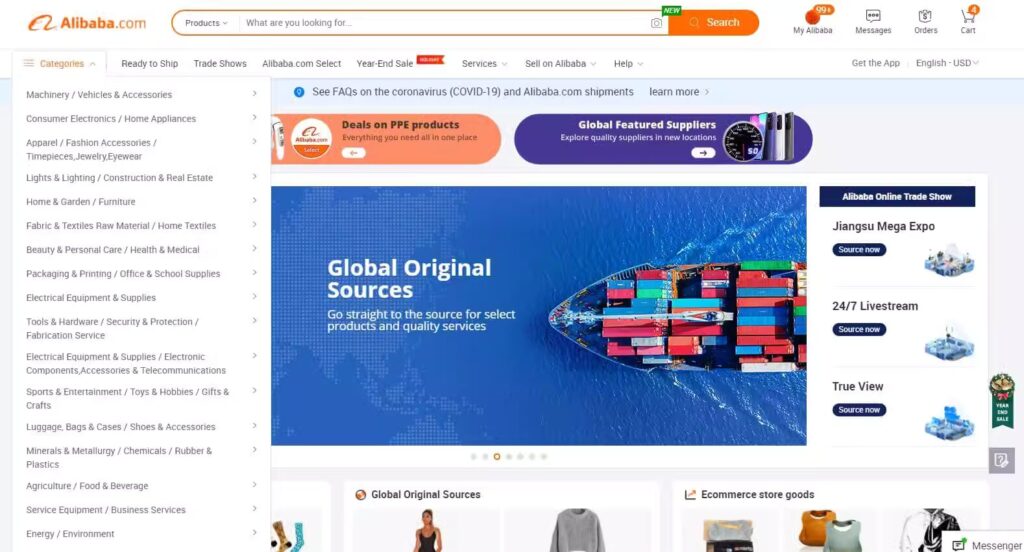
While AliExpess works in the B2C segment, Alibaba.com is the leading B2B marketplace. It mostly works with small and medium-sized businesses and is used by 36.5% wholesale buyers globally. It is a multi-vendor B2B marketplace, represented in over 200 countries, with over 40,000,000 active buyers making 400,000 product inquiries daily.
Features of Alibaba
It allows a 30-day free trial for up to 50 product listings, a suite of smart business tools, data analytics with dashboards demonstrating product exposure, store visits and other metrics. Upgrading to paid plans, sellers can list unlimited products, paying from 1 to 2 per cent for orders below $5000, or go further to get a Gold Supplier status with numerous extra perks. Alibaba allows advertising to improve product visibility and search rankings, along with the usual set of instruments one can expect from an online selling platform: a product catalog, communication and translation tools, order management and payment protection.
Storefronts, or ‘minisites’ on Alibaba are customizable, searchable and scalable, and cater to sellers from virtually any business: electronics and machinery, apparel and textiles, health and medicine, home and garden, automotive and chemicals, etc. This B2B marketplace features a powerful collection of articles and other resources to share export-import tips, insights on trends, guides for beginners etc. In addition to the website, Alibaba also offers a mobile application to find products and make purchases right from a mobile device.
Alibaba’s downsides
Having a huge daily traffic, international representation, powerful marketing and analytical tools for sellers from most imaginable industries, Alibaba has a few downsides as well: high competition, where your store may be lost among others, poor-quality translations, which might make your business seem unprofessional, and subscription plans, where you have to pay, if you wish to take advantage of business tools and advertising.
Amazon Business
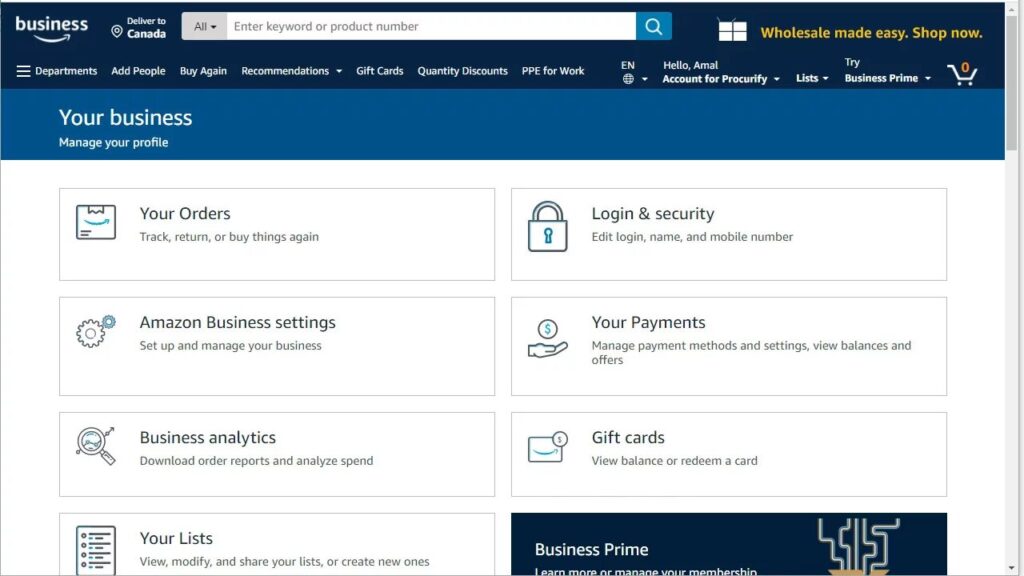
Amazon is the world’s second largest retailer, with $239 bln of revenue in 2021. However, Amazon is well-presented on the B2B plane as well, with its Amazon Business e-commerce operations. While Alibaba is the major Asia-based B2B marketplace, Amazon Business is the main player of the US B2B market. In 2021, its net sales reached $56.5 bln, and 78.4% of corporate US buyers use it to research and purchase goods.
The marketplace is horizontal and aimed at B2B customers across various industries: computers and accessories, office, industrial and scientific supplies, food and restaurant, hospitality and education, healthcare and sanitation — you name it.
Advantages of Amazon Business
Amazon Business offers a huge set of tools and features, from visual dashboards with various metrics, like sales snapshots and top products, to fully loaded product listings, enabling sellers to include manufacturer specs, user guides, CAD drawings, installation manuals etc. for better informed buying decisions. If you already have a seller account on Amazon as a retailer, you can connect a B2B option, with tiered discounts, business price quoting and extra marketing tools. Amazon Business offers a powerful B2B Central service, which provides recommendations and tips for beginners or those looking to extend their sales. You will also enjoy reporting tools, a choice of different purchasing options and payment terms, and, of course, a well-established name that is often seen as the first go-to place.
In terms of price to be an Amazon Business seller: there is an individual plan at $0.99 per unit sold and a professional plan at $39.99 per month irrespective of the number of units you sell. Amazon Business also can fulfill your orders, where you ship your goods to the marketplace’s warehouse, and it handles the rest, including refunds and returns.
Amazon Business’s customer base is huge and includes Fortune 100 companies, a large portion of reputable educational establishments, hospitals and even local governments, which means a seller can get a considerable pool of buyers. Amazon’s brand lends its halo to the vendors of the marketplace, offering you the benefit of the trust and credibility people have in the name. Added with the necessary infrastructure and support, Amazon’s online B2B marketplace platform is a great choice of a B2B marketplace, but even here there are a few downsides.
Cons of Amazon Business
You have less direct contact with your customers, which means you have little control over customer relationships. There are a lot of limitations on the types of goods eligible, and many require approval. Not all goods sell equally well – for example, bulky items are reported to be pushed out of the scope. Besides, some categories are over-represented, while others are under-represented. The main disadvantage, however, is that your brand may lose its distinctions and will only look as one of the many, and you lose control over your brand and its image. Amazon Business is not a white label B2B marketplace, which means it provides businesses a platform for transactions, but operates the platform itself, not allowing its sellers to white-label their storefronts with their own branding and customization.
Upwork

Upwork is often seen as a primarily freelancing platform, but in fact it lists both freelancers and companies, which makes it a truly B2B marketplace for selling and buying services. Upwork connects businesses seeking professional expertise with a large pool of professionals, be it individuals or agencies. Upwork covers the following categories of service: website and app development, AI and design, finance and accounting, engineering and architecture, sales and marketing, writing and translation, with hundreds of specific skills in each. Whether you are a tiny startup or a Fortune 100, Upwork has expertise to offer.
Upwork’s benefits
The marketplace ensures proof of quality, verified work history and customer reviews, interviews with potential service suppliers and 24/7 support. Their robust application is a great example of B2B marketplace software, winning the G2’s 2021 Best Software Award. You can browse profiles and portfolios using advanced search filters – or post a job and wait for proposals. Upwork also provides tools for managing your projects, with chats, video calls and file sharing, advanced reporting and tracking, safe and easy payments and pay-as-you-go options.
Upwork charges service vendors a 10% service fee on their earnings. As a buyer, you will pay a 5% Client Marketplace Fee on all payments that you make to the talents you have hired and a one-time contract initiation fee of up to $4.95 USD for each new contract.
Upwork’s weaknesses
On the downside – entrusting your project to an agency registered on Upwork, you have less control over it and may feel insufficient ownership. Besides, despite the decent verification procedures, you may still run into quality and reliability issues. While offering a great pricing variability, which allows you to find a service vendor to fit your budget, it may be challenging to find the right quality-vs-cost balance. Plus, like with any outsourcing, there are time zone differences and potential cultural and communication issues.
There are dozens of other horizontal B2B marketplaces with a wide range of industries, target audiences and regions. Now, let’s look at a few vertical, or niche, marketplaces, for industries where e-commerce seemed unimaginable just a few years ago.
GoDirect Trade

We have already mentioned Honeywell, a technology and manufacturing conglomerate with 97,000 employees and hundreds of B2B products and solutions, aerospace being one of its 4 large segments. For this domain, it produces engines and integrated avionics, radar and surveillance systems, navigation and flight safety hardware, aircraft wheels and brakes, data and software applications and spare parts.
Until just a few years ago, shopping online for aviation spare parts was unheard of for the aerospace industry. So Honeywell launched GoDirect Trade – an online marketplace that connects buyers and sellers in the aerospace industry from around the world. Mentioned in Forbes, this unique marketplace of used and new aircraft parts features engines and electronics, APU and blades for rotors, turbines and compressors, plane wheels and brakes and hundreds of other parts and counts over 12,000 users and 4,000 companies, promising to ‘keep you flying and take the industry to new heights’. The GoDirect Trade uses Blockchain technology to monitor the product life cycle, multilingual support and options to offer products on lease or auction them to sell to the highest bidder.
Unlike other marketplaces, GoDirect Trade is totally free as it offers a self-service listing process.
Mable
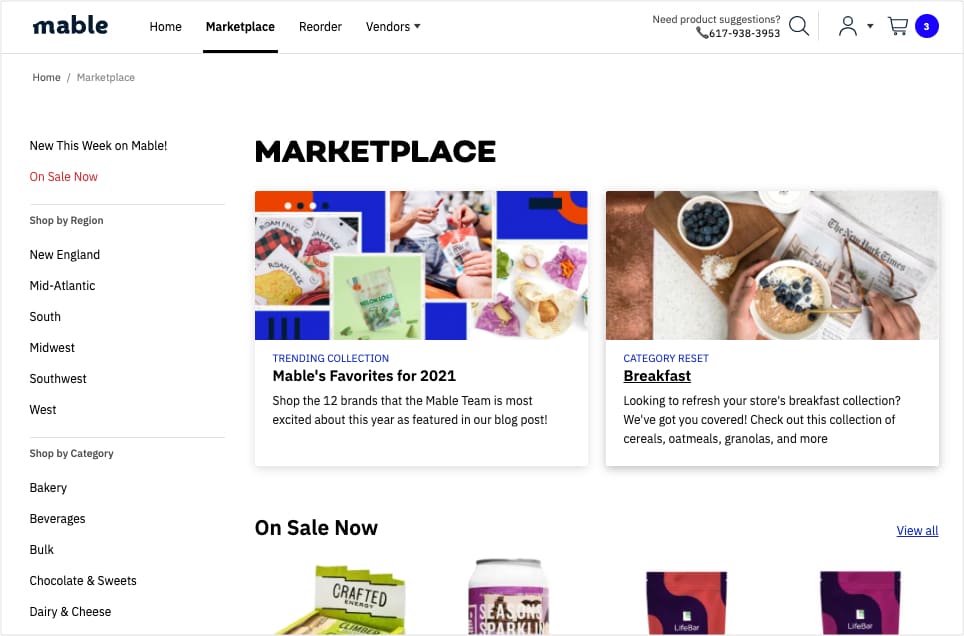
If you thought food is not something to be sold on a B2B marketplace, think again. Mable is a rather new platform that brings together US brands manufacturing food and beverages. This B2B wholesale marketplace lists over 3,000 brands, focuses on sustainability that local brands ensure and caters to businesses that care for their customers’ health, wellness and dietary preferences. It allows buyers to know who exactly makes the supplies they buy, where they come from and who the owner is. It gives small manufacturers access to broad distribution and makes sure you can align with your customers’ values.
It is free to get started, and then you only pay a 12.5% commission and a 12.5% one-time referral fee on new accounts the platform brings you. Easy ordering, drop shipping and assistance with sales and marketing make Mable a very attractive platform for both local food manufacturers and buyers.
Arrow
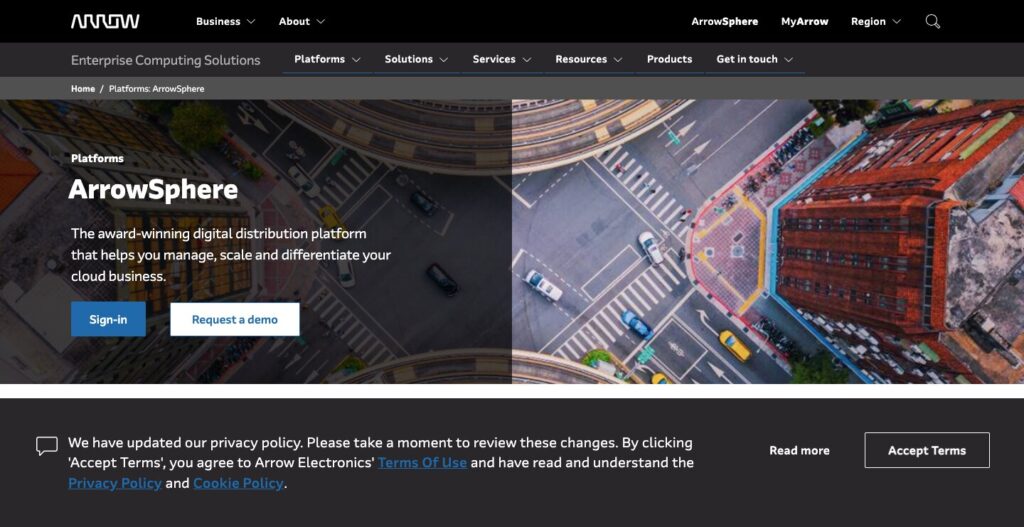
Arrow is a platform ‘where opportunity meets technology’ and claims to ‘bridge the space between if and how’. This marketplace specializes in technology and electronics and gives access to 210,000 leading technology manufacturers and service providers. Arrow’s portfolio encompasses a huge range of products, from computer products, displays, sensors, controllers, resistors and processors to embedded systems, power supplies, lighting solutions and programmable devices.
In addition to thousands of products, big and small, in over 50 categories, Arrow provides datasheets and reference designs and can not only connect you to key suppliers of hardware and electronics, but also deliver engineering services to bring your idea to life. Arrow engineers offer expertise in aerospace and automotive, automation and medical devices, consumer electronics and semiconductors.
G2 and Capterra as B2B SaaS platforms
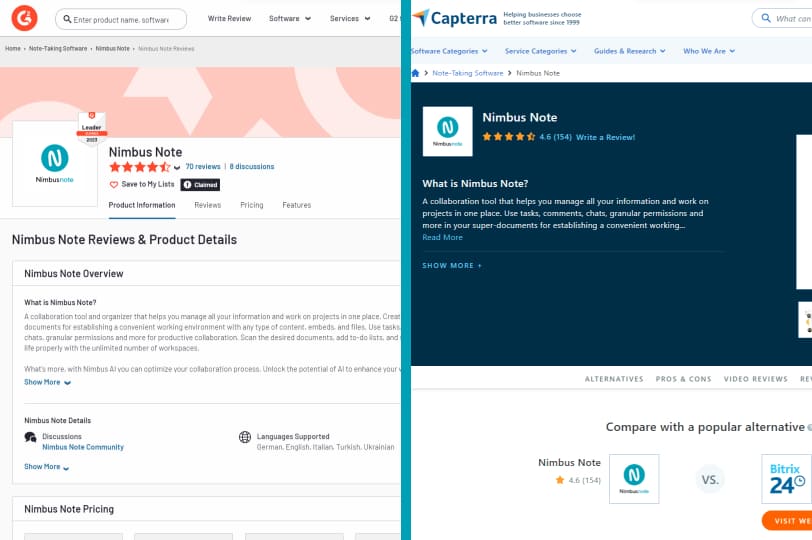
Among other types of marketplaces, we should mention B2B SaaS (Software as a Service) platforms. A B2B SaaS marketplace is a platform connecting businesses looking for software solutions with software vendors or providers. It serves as an intermediary that helps a business to discover, evaluate and buy a software product or service, offering a curated selection of solutions with proof of quality and access to customer ratings and reviews.
Two such examples are G2 and Capterra. Both these SaaS marketplaces offer opportunities for software vendors to engage with potential customers. Vendors can create profiles, respond to user reviews, and take part in promotional activities. Buyers, in turn, can study detailed feedback, compare various solutions and find those that fit their tech stack needs and budgets. They are valuable resources to explore the software vendor market and assist businesses in their decision-making process.
Conclusion
In the few recent years, e-commerce has gone far beyond online stores with the usual consumer goods to giant marketplaces giving everyone access to a huge selection of products and now to B2B marketplace platforms. In the US alone, B2B marketplace companies went from $24.3 bln in 2019 to $112 bln in 2022. An online B2B marketplace gives a huge advantage to both the manufacturer or service provider and to the buyer, allowing them to find better fits, prices and conditions.
When choosing a particular B2B marketplace, it is important to consider how different platforms satisfy your needs – while a horizontal B2B wholesale marketplace gives access to a wider range of products and a bigger customer pool, a niche platform is better focused on your target audience who are already interested in what you have to offer.
